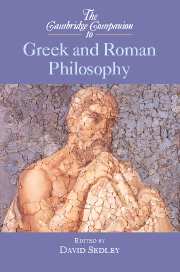Book contents
- Frontmatter
- Introduction
- 1 Argument in ancient philosophy
- 2 The Presocratics
- 3 The Sophists and Socrates
- 4 Plato
- 5 Aristotle
- 6 Hellenistic philosophy
- 7 Roman philosophy
- 8 Philosophy and literature
- 9 Late ancient philosophy
- 10 Philosophy and science
- 11 Philosophy and religion
- 12 The legacy of ancient philosophy
- Bibliography
- Glossary
- Index
8 - Philosophy and literature
Published online by Cambridge University Press: 28 May 2006
- Frontmatter
- Introduction
- 1 Argument in ancient philosophy
- 2 The Presocratics
- 3 The Sophists and Socrates
- 4 Plato
- 5 Aristotle
- 6 Hellenistic philosophy
- 7 Roman philosophy
- 8 Philosophy and literature
- 9 Late ancient philosophy
- 10 Philosophy and science
- 11 Philosophy and religion
- 12 The legacy of ancient philosophy
- Bibliography
- Glossary
- Index
Summary
Introduction
Greek and Roman philosophy developed in a close and frequently adversarial relationship to various literary genres, especially epic and lyric poetry and tragic and comic drama. Moreover, philosophers themselves used some of these genres and created still others (such as the philosophical dialogue, the philosophical epistle); the literary form of philosophical texts is frequently an essential ingredient in their philosophical expression. Philosophers thought in subtle ways about what literary genres themselves express about human life and what is important in it; their contest with the tragedians and other authors was thus fought both on the level of content and on the level of form or style itself. At the same time, literary authors made their own claims to tell the truth about important human matters, going in some cases deliberately against the theories of philosophers. This being the case, the topic of philosophy’s relation to literature in ancient Greece and Rome is as vast as the subject of philosophy itself, and cannot be treated exhaustively.
- Type
- Chapter
- Information
- The Cambridge Companion to Greek and Roman Philosophy , pp. 211 - 241Publisher: Cambridge University PressPrint publication year: 2003
- 13
- Cited by



